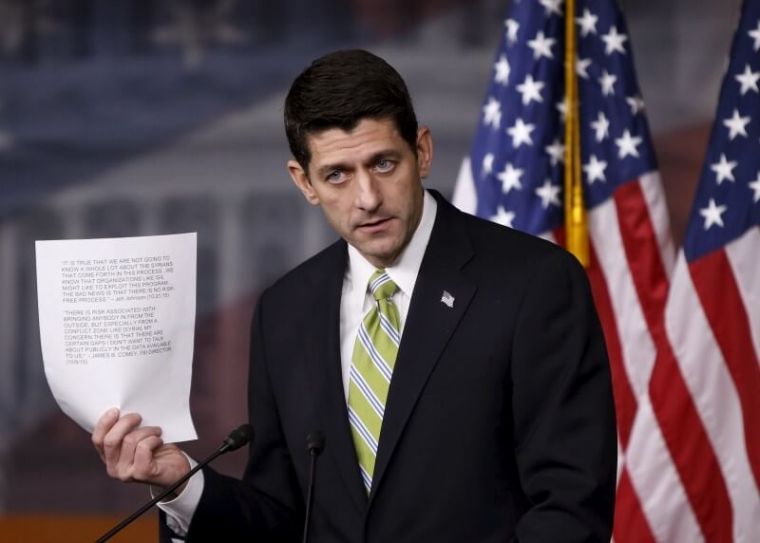US House votes to suspend acceptance of Syrian refugees
The US House of Representatives has overwhelmingly passed legislation to suspend Obama's program to admit 10,000 Syrian refugees in the next year.
Despite a veto threat from President Barack Obama, the House approved the Republican-backed legislation by 289-137 with 47 of Obama's 188 fellow Democrats breaking with the White House to support it. The measure, quickly drafted this week following the Islamic State attacks in Paris on Friday that killed 129 people, moves to suspend the acceptance of Syrian refugees and intensify screening them.

It would require that high-level officials - the FBI director, the director of national intelligence and homeland security secretary - verify that each Syrian refugee poses no security risk.
Republican House Speaker Paul Ryan said the bill would pause the program the White House announced in September to admit 10,000 Syrian refugees over the next year. He said it was important to act quickly "when our national security is at stake."
After the House vote, Obama's attorney general, Loretta Lynch, called such screening both impractical and impossible.
"To ask me to have my FBI director or other members of the administration make personal guarantees would effectively grind the program to a halt," Lynch told reporters at a news briefing with FBI Director James Comey.
The vote result came despite a last-ditch appeal for Democratic votes from Jeh Johnson, Obama's secretary of homeland security, and Denis McDonough, his chief of staff.
It followed a testy exchange at a House hearing between lawmakers and Anne Richard, the assistant secretary of state for population, refugees and migration. Republicans responded with incredulity to her assertion there was only a "very, very small" threat of any of the Syrian refugees being a "terrorist".
Some Republicans have said some refugees could be militants bent on attacking the United States, noting reports that at least one Paris attacker may have slipped into Europe among migrants registered in Greece.
The bill, which would create the strictest-ever U.S. screening of refugees from a war-torn nation, passed with the two-thirds majority the House would need to override a presidential veto. It now goes to the Senate, also controlled by Republicans, where its prospects remained uncertain.
If it passes in the Senate, each chamber would have to muster a two-thirds majority to override any Obama veto.
Senate Democratic Leader Harry Reid said there was "no way" the House bill would pass in the Senate.
While many Americans see the United States historically as welcoming to immigrants, accepting refugees from Syria has raised concerns the newcomers may pose a national security threat in a country where about 3,000 people were killed by al Qaeda militants in the Sept. 11, 2001, attacks.
Lawmakers have been receiving an unusually large number of calls on the issue. An aide to Ohio Republican Senator Rob Portman said his office got 2,710 calls between Monday and Wednesday opposing resettlement of Syrian/Iraqi refugees in the United States, versus only 58 in favor.
'SPASM OF RHETORIC'
Speaking in Manila after meeting with Canada's prime minister, Obama said America had always been open to allowing people from war zones to find refuge in the United States, where they become "part of the fabric of American life".
Denouncing the "spasm of rhetoric" over refugees, Obama said refugees already faced the most vigorous vetting process for anyone admitted to the country. He added that "the idea that somehow they pose a more significant threat than all the tourists who pour into the United States every single day just doesn't jibe with reality."
The White House had said Obama would veto the House bill because it would introduce "unnecessary and impractical requirements" that would hamper efforts to help some of the world's most vulnerable people without providing meaningful additional security for Americans.
"Our position on this piece of legislation has not changed," an official on board Air Force One, carrying Obama to a Southeast Asian summit in Malaysia on Friday, quoted White House spokesman Josh Earnest as saying.
Comey said there was no credible threat of an attack on U.S. soil similar to the one in Paris, but his agency is monitoring dozens of people it has deemed "high-risk" for copying the attack.
Islamic State militants released a video on Thursday threatening the White House with suicide bombings and car blasts. The threat came a day after another video from the militant group that suggested New York was a potential target.
Ben Carson, a leading 2016 Republican presidential candidate, likened Syrian refugees to "a rabid dog running around your neighborhood," and said admitting them would put Americans at risk.
Some Democrats touted a different approach, promising legislation in the Senate to tighten a visa waiver program that intelligence experts say can be exploited by Islamic State militants or others planning U.S. attacks.
Earnest said White House staff were talking with members of Congress on reforming the program.
"This is an area where additional scrutiny and reforms could be useful in enhancing the national security of the United States," he was quoted as saying.
Honduras said on Wednesday it had detained five Syrians seeking to reach the United States for traveling on doctored Greek passports, but authorities in the Central American country said the men did not belong to "any terrorist cell" and four were college students.
The U.S. Department of Homeland Security said members of two Syrian families - two men, two women and four children - turned themselves in to U.S. authorities in Laredo, Texas, on the Mexican border. There was no evidence the Syrians had any connection to terrorism, U.S. officials said











